
To discuss: The consideration and explain the meaning of legal sufficiency.
Explanation of Solution
Legal sufficiency:
The thinking is the legitimate confidence that bolsters a guarantee in a contract; it is the assignment to establish an enforceable contract. For the guarantee to be legitimately adequate, the thought must either be a lawful disservice to the promise or a legitimate advantage to the promisor. In other words, in exchange for the pledge, the promiser must get some legitimate esteem or the promisor must give up something of legitimate esteem. The legitimate responsibility does not hurt cruelly, but or perhaps something that was already under no valid obligation by the promisor to do or abstain from doing. Legal benefit means that the promiser obtains that which he had no prior legal right to obtain.
Adequacy:
Legitimate appropriateness has nothing to do with the broadness of thought. Whether the deal was "fair" or either excellent or terrible for either party is not at all concerned with the need for genuinely adequate thinking. Essentially, the condition is: (1) that the parties have freely agreed to a trade and (2) that the subject matter has been exchanged or promised in exchange, either causing the promisee to have a legal disservice or giving the promisor a legal advantage.
Unilateral Contracts:
In a one-sided contract, one party (the promiser) is providing a pledge from another party (the promisee) for an operation (or prohibition from acting). For return, the promisee does not offer a commitment, but simply fulfils the operation or constraint to the overall contract.
Bilateral Contracts:
There is an exchange of promises in a respective deal, so every party is both a promiser and a promisee.
Want to see more full solutions like this?
Chapter 12 Solutions
Smith and Roberson’s Business Law
- 6 - A contract must always contain explicit written terms in order for it to be legally upheld. TrueFalsearrow_forwardSam Simpleton, a resident of Kansas, and Nellie Naive, a resident of Missouri, each bought $85,000 in stock at local offices in their home States from Evil Stockbrokers, Inc. (“Evil”), a business incorporated in Delaware, with its principal place of business in Kansas. Both Simpleton and Naive believe that they were cheated by Evil Stockbrokers and would like to sue Evil for fraud. Assuming that no Federal question is at issue, assess the accuracy of the following statements: a. Simpleton can sue Evil in a Kansas State trial court. b. Simpleton can sue Evil in a Federal district court in Kansas. c. Naive can sue Evil in a Missouri State trial court. d. Naive can sue Evil in a Federal district court in Missouri.arrow_forwardWhich one of the following is a term that is implied by statute? Select one: a. A term required to make the contract between the parties effective b. A term that goods must be of merchantable quality c. Good faith d. A term implied on the basis of past dealings between the partiesarrow_forward
- In obligations to give, what are the different rights which are available to the creditor?arrow_forwardexplain in detail the penalty for failure to furnish a return or statement (section 182) and penalty for concealement of income (section 184)arrow_forwardBusiness contracts may contain exclusion clauses as a means of limiting or excluding liabilities. Explain what is meant by the term “exclusion clause” and how case law and statutes regulate the use of such clauses in business contracts.arrow_forward
- According to the CISG, when a contract is for sale of goods by description, a slight breach may be treated as a fundamental breach. True or False. Explain.arrow_forwardDiscuss the common law position of possibility of performance. By advising a person whether the common law only, can assist him in suspending payments during the "LOCKDOWN"arrow_forwardExplain Void and voidable contracts with examples ?arrow_forward
- Under a Commercial General Lability policy, which of the folkwing actions is an obligation of the lisaree?arrow_forwardMay a moral obligation constitute a sufficient cause to support an onerous contract?arrow_forwardThe statute of limitations in Texas is a.four years for a written contract. b.four years for an oral contract for a 6-month lease. c.four years for all contracts for the sale or lease of real property in Texas. d.six years for a written contract.arrow_forward
 Understanding BusinessManagementISBN:9781259929434Author:William NickelsPublisher:McGraw-Hill Education
Understanding BusinessManagementISBN:9781259929434Author:William NickelsPublisher:McGraw-Hill Education Management (14th Edition)ManagementISBN:9780134527604Author:Stephen P. Robbins, Mary A. CoulterPublisher:PEARSON
Management (14th Edition)ManagementISBN:9780134527604Author:Stephen P. Robbins, Mary A. CoulterPublisher:PEARSON Spreadsheet Modeling & Decision Analysis: A Pract...ManagementISBN:9781305947412Author:Cliff RagsdalePublisher:Cengage Learning
Spreadsheet Modeling & Decision Analysis: A Pract...ManagementISBN:9781305947412Author:Cliff RagsdalePublisher:Cengage Learning Management Information Systems: Managing The Digi...ManagementISBN:9780135191798Author:Kenneth C. Laudon, Jane P. LaudonPublisher:PEARSON
Management Information Systems: Managing The Digi...ManagementISBN:9780135191798Author:Kenneth C. Laudon, Jane P. LaudonPublisher:PEARSON Business Essentials (12th Edition) (What's New in...ManagementISBN:9780134728391Author:Ronald J. Ebert, Ricky W. GriffinPublisher:PEARSON
Business Essentials (12th Edition) (What's New in...ManagementISBN:9780134728391Author:Ronald J. Ebert, Ricky W. GriffinPublisher:PEARSON Fundamentals of Management (10th Edition)ManagementISBN:9780134237473Author:Stephen P. Robbins, Mary A. Coulter, David A. De CenzoPublisher:PEARSON
Fundamentals of Management (10th Edition)ManagementISBN:9780134237473Author:Stephen P. Robbins, Mary A. Coulter, David A. De CenzoPublisher:PEARSON





